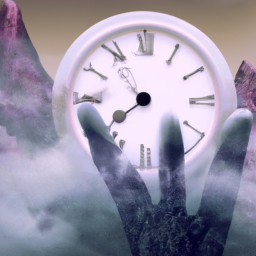As a Muslim, I have always been intrigued by the significance of dreams in Islam. In our faith, dreams are seen as a meaningful way for Allah (SWT) to communicate with believers. Stories from Islamic tradition, including those of Prophet Muhammad (PBUH) and his companions, are rich with examples of dreams shaping individuals’ fates.
In this article, we will explore what dreams mean in Islam. We will delve into the science behind dreaming, different types of dreams that exist according to Islamic teachings, symbols and interpretations associated with them, and their historical significance.
Furthermore, we will discuss how dreams can help us grow personally and aid us in making better decisions while debunking common misconceptions about them prevalent among Muslims.
Key Takeaways
- Dreams in Islam are considered a means of communication between Allah and His believers, and have played a significant role throughout Islamic history in providing guidance and direction.
- There are five main categories of dream interpretations in Islam, with prophetic dreams holding significant meaning and requiring interpretation by knowledgeable individuals.
- Dreams can facilitate personal growth, emotional healing, and aid in decision-making by providing insights into areas of ourselves that need attention or change.
- While dreams can be a source of guidance and inspiration, they should not replace practical aspects of faith such as prayer, charity, and good deeds, and interpretation should be done with caution and guidance from trusted religious authorities.
The Importance of Dreams in Islamic Faith
Dreams hold a significant place in Islam, playing a crucial role in guiding believers on their spiritual journey. As Muslims, we believe that dreams are divine messages from Allah and should be taken seriously.
Dream journaling is one way to keep track of these messages and reflect on their meanings. By recording our dreams, we can analyze patterns, symbols, and themes that may appear, helping us to better understand what Allah is trying to communicate with us.
In addition to dream journaling, lucid dreaming is also an important aspect of understanding the significance of dreams in Islamic faith. Lucid dreaming allows us to take control of our dreams and interact with them in a conscious state. This practice can help us gain insight into subconscious thoughts or fears that may be hindering our spiritual growth.
Overall, the importance of dreams in Islam cannot be overstated. By paying close attention to our dreams and interpreting them through prayer and reflection, we can receive guidance from Allah on our life’s journey.
In the next section about "the science of dreams,"we will explore how modern science has helped shed light on this ancient practice of dream interpretation without losing sight of its religious significance.
The Science of Dreams
You’ll be fascinated by how the science of interpreting your subconscious mind works in Islam. Dreams have always been a subject of interest and fascination, not just for religious scholars, but also for psychologists and scientists alike.
In Islam, dreams are believed to hold significant meaning and can provide insight into an individual’s life. Scientific theories suggest that dreams are a result of psychological factors such as stress, anxiety, and emotions that are suppressed during the day. However, in Islamic belief, dreams are seen as messages from Allah or angels to guide individuals towards the right path. It is believed that Allah communicates with His creation through dreams if they cannot hear Him through other means.
To interpret one’s dream in Islam, it is essential to understand its context and symbolism. In fact, there are five main categories of dream interpretations in Islam – truthful dreams (ru’ya), false or vain dreams (hulm), mixed or confused dreams (munkar), nightmares (shaytan), and prophetic or divine dreams (wahi). Each type requires different approaches to interpretation based on its characteristics.
Understanding the science behind interpreting our subconscious mind is crucial for comprehending the significance of our dreams in Islam. The psychological factors that contribute to dreaming may play a role; however, it’s also essential to recognize their religious implications. With this foundation knowledge established about the scientific theories surrounding dream interpretation within Islamic traditions, let’s dive deeper into exploring the types of dreams in Islam without further ado!
Types of Dreams in Islam
Understanding the significance of different types of subconscious messages is crucial in comprehending one’s spiritual journey in Islam. Dreams play a significant role in Islamic beliefs, as they’re believed to be a means through which Allah communicates with His servants.
There are two main categories of dreams in Islam: ordinary and prophetic dreams. Ordinary dreams are those that don’t have any special symbolic meaning. They’re simply a reflection of our thoughts, fears, and desires, often without any coherence or logical sequence.
Prophetic dreams, on the other hand, are believed to contain important messages from Allah. These can include warnings or guidance about future events or personal matters. Common symbols found in prophetic dreams include snakes, water, fire, and flying. These symbols hold specific meanings that can vary depending on the context of the dream and the interpretation given by scholars and experts.
It’s important for Muslims to seek advice from knowledgeable individuals when trying to interpret their own prophetic dreams. Understanding the different types of dreams in Islam is an important aspect of one’s spiritual journey. Prophetic dreams hold significant meaning and can provide guidance for believers seeking direction from Allah. Symbols found within these dreams require interpretation by knowledgeable individuals who can help decipher their true purpose and message.
Symbols and Interpretations
Get ready to explore the fascinating world of symbols and their interpretations in Islamic prophetic dreams! As I mentioned earlier, interpreting a dream is not an easy task. However, scholars have developed various techniques over the years to help understand these dreams. The interpretation of prophetic dreams involves analyzing different types of symbols and then associating them with certain events or circumstances.
One of the most common symbols found in Islamic prophetic dreams is water. This symbol represents life and purification in Islam. Depending on the context in which it appears, water can also represent wealth, knowledge, or even death. Another common symbol is fire, which often signifies danger or temptation. Similarly, snakes are often interpreted as symbolic of deceit or danger.
When interpreting a dream, it’s important to consider both the specific symbols present as well as the overall feeling and atmosphere of the dream itself. Dreams that are filled with light and positivity are generally seen as good omens, while dark or ominous dreams may indicate potential challenges or difficulties ahead. By using interpretation techniques such as these and looking for common symbols like those mentioned above, we can begin to unravel the mysteries hidden within our own subconscious minds.
As we delve deeper into understanding what our dreams mean in Islam, it’s important to remember that this practice has a long history within our faith. From Prophet Ibrahim’s vision of sacrificing his son to Prophet Yusuf’s ability to interpret Pharaoh’s dream about seven fat cows being eaten by seven lean ones, dreams have played a significant role throughout Islamic history. In my next section, we will explore some more examples of these important moments from our religion’s past.
Dreams in Islamic History
As Muslims, we can gain a deeper understanding of our history and faith by exploring the significance of prophetic visions and their interpretations. Islamic dream interpretation has a long and rich tradition in our culture, dating back to the time of Prophet Muhammad (peace be upon him) himself. The Prophet was known to receive numerous revelations from Allah through his dreams, which he would then share with his companions.
One famous dream story in Islamic history is that of Prophet Ibrahim (Abraham), who dreamed that he was sacrificing his son Ismail (Ishmael) as an act of obedience to Allah’s command. This dream was interpreted as a test of Ibrahim’s faith, and he ultimately passed this test by showing his willingness to obey Allah’s will above all else.
Another well-known example is the dream of Yusuf (Joseph), who saw eleven stars, the sun, and the moon bowing down to him. This dream foretold Yusuf’s future rise to power over his brothers.
Dreams have played a significant role in shaping Islamic history, providing guidance and direction for many individuals throughout the ages. By studying these stories, we can learn valuable lessons about faith, perseverance, and trust in Allah’s plan for us.
In the next section about the role of dreams in personal growth, we’ll explore how we can use these teachings to cultivate our own spiritual development.
The Role of Dreams in Personal Growth
Exploring the impact of dreams on our personal growth can be a transformative journey that inspires us to connect with our inner selves and uncover hidden truths about our lives. Dreams have been known to help individuals gain insight into their emotions, thoughts, and behaviors. In Islam, dreams hold significant importance as they are believed to be a way in which Allah communicates with His followers.
Personal interpretation is crucial when it comes to understanding what messages we may receive through our dreams. It is important to note that not all dreams hold prophetic meanings or divine revelations, but rather they may serve as symbols for something deeper within us. Through self-reflection and contemplation, we can discern the meaning behind our dreams and use them as tools for emotional healing.
Dreams have the power to facilitate personal growth by providing insights into areas of ourselves that need attention or change. Emotional healing can occur when we address these aspects of ourselves through introspection, forgiveness, and acceptance. As we continue on this journey of self-discovery through interpreting our dreams, we will begin to see positive changes in how we perceive ourselves and interact with others.
As we delve deeper into the significance of dreams in Islam, it is important to also understand how they can aid us in decision making. By listening closely to the messages conveyed through our dreams, we can gain clarity and guidance when faced with difficult choices.
Dreams and Decision Making
As a Muslim, I believe that seeking guidance from Allah is crucial in making important decisions. The Quran teaches us to turn to prayer and reflection when faced with difficult choices.
It’s through these practices that we can trust in Allah’s plan and find clarity in our decision-making process.
Seeking Guidance in Important Decisions
When facing an important decision, Muslims may turn to their dreams for guidance and seek the interpretation of a trusted scholar. Consulting scholars is an important aspect of Islamic tradition, as they have the knowledge and experience to provide valuable insight into various matters.
However, personal experience also plays a significant role in interpreting dreams. The Prophet Muhammad (peace be upon him) said, "The dream of a Muslim man or woman is one of the forty-six parts of prophethood."This highlights the importance placed on dreams in Islam and encourages individuals to pay attention to them.
In addition to seeking guidance through dreams, it is essential for Muslims to engage in prayer and reflection when making important decisions. Prayer allows individuals to connect with Allah (SWT) and seek His guidance directly. It provides a sense of peace and clarity that can aid in decision-making processes.
Reflecting on past experiences can also provide valuable insights into how certain decisions may impact one’s life and those around them. By combining these practices with seeking interpretations from scholars based on their understanding of Quranic teachings, Muslims can make more informed decisions that align with their faith values.
The Importance of Prayer and Reflection
As Muslims, we believe that seeking guidance from Allah is essential in making important decisions. It’s through prayer and reflection that we can find clarity and direction in our lives.
Prayer discipline allows us to connect with Allah and seek His guidance, while self-reflection techniques help us better understand ourselves and our desires.
Through prayer, we can ask for guidance from Allah and seek His help in making important decisions. This prayer discipline also helps us to remain grounded in our faith and reminds us of our purpose in life.
Additionally, self-reflection techniques such as meditation or journaling allow us to examine our thoughts, feelings, and beliefs. By doing so, we can gain a deeper understanding of ourselves and what truly matters to us.
In trusting in Allah’s plan for us, it’s important to maintain a strong connection with Him through prayer and self-reflection. By doing so, we can seek His guidance when facing difficult decisions or challenges that may arise in life without losing sight of our true purpose.
Trusting in Allah’s Plan
To truly trust in Allah’s plan, you must have faith in His guidance and believe that He has a purpose for every step of your journey. Trusting in Allah’s plan means surrendering to fate and knowing that everything happens for a reason.
Here are five ways to deepen your trust in Allah’s plan:
- Practice gratitude: Always remember to express gratitude for the blessings Allah has given you, even during difficult times.
- Let go of control: Recognize that you can’t control everything and that some things are simply beyond your power.
- Embrace uncertainty: Instead of fearing the unknown, embrace it as an opportunity for growth and learning.
- Seek knowledge: Continue to learn about Islam and seek knowledge from trusted sources to strengthen your faith.
- Pray for guidance: Turn to Allah through prayer when you need guidance or reassurance.
Trusting in Allah’s plan isn’t always easy, but it can bring immense peace and comfort. In the next section, we’ll explore how dreams fit into this larger picture of reality.
The Connection Between Dreams and Reality
Hey, did you know that dreams can reveal hidden truths about your reality in Islam? As Muslims, we believe that our dreams are connected to the world of the unseen and can provide insights into our waking lives. Exploring symbolism is a common practice among Muslims when interpreting their dreams. We believe that every dream has a meaning and it’s important to understand what Allah may be trying to communicate through them.
Psychological theories suggest that dreams reflect our subconscious thoughts and desires. In Islam, we take this belief a step further by acknowledging that these subconscious thoughts may be influenced by spiritual forces as well. For example, if one has been struggling with personal issues or spiritual dilemmas, they may experience recurring dreams related to those struggles. These types of dreams could indicate the need for introspection or guidance from Allah.
It’s important to note that not all dreams have significant meanings and interpretations should not be taken too literally. Common misconceptions about dreams in Islam include assuming every dream holds some sort of prophecy or predicting future events based on them. However, we must remember that only Allah knows what will happen in the future and while certain symbols or themes in a dream may hold significance, it’s important to approach dream interpretation with caution and seek advice from trusted sources such as Islamic scholars or counselors.
Common Misconceptions About Dreams in Islam
As a Muslim, I’ve come across many misconceptions about dreams in Islam.
For instance, some people believe that dreams can be used for fortune-telling purposes.
Others believe that if they dream of performing an act of worship, it replaces the need to perform the actual act.
However, it’s important to maintain balance and interpret our dreams with knowledge and guidance from Islamic teachings.
Dreams as Fortune-telling
You can gain insight into future events by interpreting your dreams, as they’re often a form of fortune-telling in Islamic belief. However, not all dreams hold the same weight and significance. Interpretation accuracy depends on various factors such as the dreamer’s mental state, physical health, and spiritual purity.
Dreams must also be interpreted within their cultural significance. To fully understand the meaning behind a dream, one must seek guidance from someone who has knowledge in Islamic dream interpretation. This person will take into account the symbols present in the dream and compare them to traditional interpretations found in Islamic literature.
It’s crucial to avoid making assumptions about the meaning of a dream without consulting an expert first. Dreams are not always literal representations of future events. The interpretation of a dream can vary based on its context. A true interpretation requires knowledge in both Islamic teachings and cultural symbolism.
Dreams as fortune-telling should not be relied upon solely for predicting future events but rather used as a tool for self-reflection and spiritual growth. In Islam, prayer is considered to be one of the most important acts of worship. Therefore, dreams can serve as an indicator of how our prayers are being received by Allah (SWT).
Dreams as a Replacement for Prayer
If you struggle with performing the five daily prayers, relying on dreams as a substitute will not provide the same spiritual benefits and growth that come from fulfilling this obligation. While dreams can have spiritual significance, they should not be used as a replacement for prayer. Dream interpretation is an important aspect of Islamic tradition, but it should never take precedence over actual worship.
To understand why dreams cannot replace prayer, let’s consider the following table:
| Prayer | Dreams |
|---|---|
| A direct communication with Allah | An indirect form of communication |
| A physical act of worship | A mental experience |
| Requires discipline and effort | Can happen randomly without any effort |
As you can see, while both prayer and dreams have their own spiritual significance, they are fundamentally different experiences. Prayer is a direct means of communicating with Allah and requires discipline and effort to perform regularly. Dreams, on the other hand, are an indirect means of communication that can happen spontaneously without any conscious effort on our part. Thus, while interpreting dreams can provide valuable insights into our lives, it cannot replace the importance and benefits of regular prayer.
It is important to strike a balance between dream interpretation and fulfilling one’s religious obligations through prayer. Understanding the spiritual significance of both experiences can lead to greater self-awareness and personal growth in one’s faith journey. In the next section, we will explore further the importance of balance in interpretation.
The Importance of Balance in Interpretation
Maintaining a balanced approach to interpreting spiritual experiences can lead to a deeper understanding of oneself and one’s faith. In the case of dreams, it’s important not to become too fixated on their meanings or to interpret them in extreme ways.
Islam teaches us that dreams can be a source of guidance and inspiration, but they shouldn’t replace the practical aspects of our faith such as prayer, charity, and good deeds. When interpreting dreams, it’s essential to avoid extremism.
This means that we shouldn’t read too much into every dream that we have or try to find hidden messages where there are none. At the same time, we should also avoid dismissing all dreams as meaningless or insignificant.
Striking a balance between these two extremes requires patience, humility, and a willingness to seek guidance from trusted religious authorities who are well-versed in Islamic teachings on dream interpretation. By doing so, we can deepen our understanding of ourselves and our relationship with Allah (SWT) while avoiding the pitfalls of extremism in interpretation.
Frequently Asked Questions
How can one distinguish between a dream that has a significant meaning and a dream that is just a product of the subconscious mind?
As a faithful Muslim, I understand the importance of distinguishing between significant and subconscious dreams. By analyzing common dream symbols and interpreting recurring dreams, I can gain insight into my subconscious mind and serve others through divine guidance. But beware, not all dreams hold meaning.
Is it necessary for Muslims to interpret their dreams and seek guidance from them?
As a Muslim, I believe in the importance of dream interpretation and seeking guidance from them. Spiritual leaders play a vital role in interpreting dreams and guiding us towards fulfilling our obligations to Allah and serving others with sincerity and humility.
Can dreams be used as a means of prophesy or foretelling the future in Islam?
Did you know that dreams have been used as a means of prophesy in Islamic beliefs? While not every dream is prophetic, some are believed to provide glimpses into the future. Dream interpretation can reveal hidden messages and guidance.
Are there any specific rituals or practices that Muslims should perform before going to bed to enhance their chances of having meaningful dreams?
To enhance my chances of having meaningful dreams, I perform pre bedtime practices such as reciting Quran, seeking forgiveness and supplicating to Allah. Additionally, dream journaling helps me reflect on the messages conveyed in my dreams.
How do cultural and personal backgrounds influence the interpretation of dreams in Islam?
As a Muslim, I believe that cultural influences and personal beliefs play a significant role in the interpretation of dreams. Our cultural background shapes our understanding of symbolism, while our personal beliefs guide us towards specific interpretations.
Conclusion
In conclusion, dreams hold a significant place in the Islamic faith. They’re believed to be a form of divine communication and serve as a means of guidance and personal growth.
The science of interpreting dreams is based on symbols and interpretations, which require knowledge and understanding. As Muslims, we should strive to recognize the importance of our dreams and seek to interpret them correctly.
Dreams can provide valuable insights into our lives, unlock hidden meanings, and help us make decisions that align with our values and beliefs. By embracing the role of dreams in Islam, we can gain a deeper understanding of ourselves and connect with the divine presence within us.
Remember that dreams are not only fleeting images but hold profound significance in Islam. They have played an essential role throughout history in guiding individuals towards their purpose in life.
As we continue on our journey towards spiritual fulfillment, let’s embrace the power of our dreams to guide us along the way.










